| Chatham | |
|---|---|
| Former Borough constituency for the House of Commons | |
| County | Kent |
| Major settlements | Chatham |
| 1832–1950 | |
| Seats | One |
| Created from | Kent |
| Replaced by | Rochester & Chatham |
Chatham was a parliamentary constituency in Kent which returned one Member of Parliament (MP) to the House of Commons of the Parliament of the United Kingdom. It was created for the 1832 general election, when the borough of Chatham was enfranchised under the Reform Act 1832.
It was abolished for the 1950 general election, when it was largely replaced by the new Rochester and Chatham constituency. This then became Medway in 1983. When the boroughs of Rochester upon Medway and Gillingham merged to form the larger unitary Borough of Medway in 1998, the Parliamentary constituency of Medway only covered part of the new borough, so for the 2010 election it was renamed Rochester and Strood.
Boundaries
1918–1950: The Borough of Rochester except part of St Peter's ward, and the Borough of Chatham wards of Luton and St John.
Members of Parliament
| Election | Member | Party | |
|---|---|---|---|
| 1832 | William Leader Maberly | Whig[1][2] | |
| 1834 by-election | George Byng | Whig[2][3][4][5][6] | |
| 1835 | Sir John Beresford, Bt. | Conservative | |
| 1837 | George Byng | Whig[2][3][4][5][6] | |
| 1852 | Sir Frederick Smith | Conservative | |
| 1853 by-election | Leicester Viney Vernon | Conservative | |
| 1857 | Sir Frederick Smith | Conservative | |
| 1865 | Arthur Otway | Liberal | |
| 1874 | George Elliot | Conservative | |
| 1875 by-election | Sir John Eldon Gorst | Conservative | |
| 1892 | Lewis Vivian Loyd | Conservative | |
| 1895 | Sir Horatio Davies | Conservative | |
| 1906 | John Jenkins | Labour | |
| 1910 | Gerald Hohler | Conservative | |
| 1918 | John Moore-Brabazon | Conservative | |
| 1929 | Frank Markham | Labour | |
| 1931 | National Labour | ||
| 1931 | Sir Park Goff | Conservative | |
| 1935 | Leonard Plugge | Conservative | |
| 1945 | Arthur Bottomley | Labour | |
| 1950 | constituency abolished: see Rochester and Chatham | ||
Elections
Elections in the 1830s
| Party | Candidate | Votes | % | ±% | |
|---|---|---|---|---|---|
| Whig | William Leader Maberly | 363 | 59.4 | ||
| Radical | Thomas Erskine Perry | 248 | 40.6 | ||
| Majority | 115 | 18.8 | |||
| Turnout | 611 | 90.3 | |||
| Registered electors | 677 | ||||
| Whig win (new seat) | |||||
Maberly resigned on appointment as a Commissioner of Customs, causing a by-election.
| Party | Candidate | Votes | % | ±% | |
|---|---|---|---|---|---|
| Whig | George Byng | 262 | 57.7 | −1.7 | |
| Tory | William Ching | 192 | 42.3 | New | |
| Majority | 70 | 15.4 | −3.4 | ||
| Turnout | 454 | 67.2 | −23.1 | ||
| Registered electors | 676 | ||||
| Whig hold | Swing | N/A | |||
| Party | Candidate | Votes | % | ±% | |
|---|---|---|---|---|---|
| Conservative | John Beresford | 323 | 52.0 | N/A | |
| Whig | George Byng | 298 | 48.0 | −11.4 | |
| Majority | 25 | 4.0 | N/A | ||
| Turnout | 621 | 92.4 | +2.1 | ||
| Registered electors | 672 | ||||
| Conservative gain from Whig | Swing | N/A | |||
| Party | Candidate | Votes | % | ±% | |
|---|---|---|---|---|---|
| Whig | George Byng | Unopposed | |||
| Registered electors | 785 | ||||
| Whig gain from Conservative | |||||
Elections in the 1840s
| Party | Candidate | Votes | % | ±% | |
|---|---|---|---|---|---|
| Whig | George Byng | 457 | 66.1 | N/A | |
| Conservative | Price Blackwood | 234 | 33.9 | New | |
| Majority | 223 | 32.2 | N/A | ||
| Turnout | 691 | 80.2 | N/A | ||
| Registered electors | 862 | ||||
| Whig hold | Swing | N/A | |||
| Party | Candidate | Votes | % | ±% | |
|---|---|---|---|---|---|
| Whig | George Byng | Unopposed | |||
| Registered electors | 1,145 | ||||
| Whig hold | |||||
Elections in the 1850s
| Party | Candidate | Votes | % | ±% | |
|---|---|---|---|---|---|
| Conservative | Frederick Smith | 636 | 56.9 | New | |
| Whig | James Stirling[8][9] | 482 | 43.1 | N/A | |
| Majority | 154 | 13.8 | N/A | ||
| Turnout | 1,118 | 81.5 | N/A | ||
| Registered electors | 1,371 | ||||
| Conservative gain from Whig | Swing | ||||
The election was declared void on petition, due to bribery, causing a by-election.[10]
| Party | Candidate | Votes | % | ±% | |
|---|---|---|---|---|---|
| Conservative | Leicester Viney Vernon | 610 | 50.5 | −6.4 | |
| Whig | James Stirling[9] | 598 | 49.5 | +6.4 | |
| Majority | 12 | 1.0 | −12.8 | ||
| Turnout | 1,208 | 90.2 | +8.7 | ||
| Registered electors | 1,339 | ||||
| Conservative hold | Swing | −6.4 | |||
| Party | Candidate | Votes | % | ±% | |
|---|---|---|---|---|---|
| Conservative | Frederick Smith | 672 | 51.1 | −5.8 | |
| Whig | William Govett Romaine[11] | 643 | 48.9 | +5.8 | |
| Majority | 29 | 2.2 | −11.6 | ||
| Turnout | 1,315 | 89.9 | +8.4 | ||
| Registered electors | 1,463 | ||||
| Conservative hold | Swing | −5.8 | |||
| Party | Candidate | Votes | % | ±% | |
|---|---|---|---|---|---|
| Conservative | Frederick Smith | 713 | 52.2 | +1.1 | |
| Liberal | Arthur Otway | 652 | 47.8 | −1.1 | |
| Majority | 61 | 4.4 | +2.2 | ||
| Turnout | 1,365 | 88.4 | −1.5 | ||
| Registered electors | 1,544 | ||||
| Conservative hold | Swing | +1.1 | |||
Elections in the 1860s
| Party | Candidate | Votes | % | ±% | |
|---|---|---|---|---|---|
| Liberal | Arthur Otway | 986 | 58.3 | +10.5 | |
| Conservative | George Elliot | 704 | 41.7 | −10.5 | |
| Majority | 282 | 16.6 | N/A | ||
| Turnout | 1,690 | 80.3 | −8.1 | ||
| Registered electors | 2,104 | ||||
| Liberal gain from Conservative | Swing | +10.5 | |||
| Party | Candidate | Votes | % | ±% | |
|---|---|---|---|---|---|
| Liberal | Arthur Otway | 2,042 | 52.4 | −5.9 | |
| Conservative | George Elliot | 1,858 | 47.6 | +5.9 | |
| Majority | 184 | 4.8 | −11.8 | ||
| Turnout | 3,900 | 86.3 | +6.0 | ||
| Registered electors | 4,518 | ||||
| Liberal hold | Swing | −5.9 | |||
Elections in the 1870s
| Party | Candidate | Votes | % | ±% | |
|---|---|---|---|---|---|
| Conservative | George Elliot | 2,132 | 59.1 | +11.5 | |
| Liberal | Arthur Otway | 1,476 | 40.9 | −11.5 | |
| Majority | 656 | 18.2 | N/A | ||
| Turnout | 3,608 | 80.8 | −5.5 | ||
| Registered electors | 4,468 | ||||
| Conservative gain from Liberal | Swing | +11.5 | |||
Elliot resigned, causing a by-election.
| Party | Candidate | Votes | % | ±% | |
|---|---|---|---|---|---|
| Conservative | John Eldon Gorst | 2,173 | 52.6 | −6.5 | |
| Liberal | William Henry Stone[12] | 1,958 | 47.4 | +6.5 | |
| Majority | 215 | 5.2 | −13.0 | ||
| Turnout | 4,131 | 83.7 | +2.9 | ||
| Registered electors | 4,935 | ||||
| Conservative hold | Swing | −6.5 | |||
Elections in the 1880s
| Party | Candidate | Votes | % | ±% | |
|---|---|---|---|---|---|
| Conservative | John Eldon Gorst | 2,499 | 51.0 | −8.1 | |
| Liberal | Henry Carr Glyn[13] | 2,398 | 49.0 | +8.1 | |
| Majority | 101 | 2.0 | −16.2 | ||
| Turnout | 4,897 | 88.3 | +7.5 | ||
| Registered electors | 5,548 | ||||
| Conservative hold | Swing | −8.1 | |||
Gorst was appointed Solicitor General for England and Wales, requiring a by-election.
| Party | Candidate | Votes | % | ±% | |
|---|---|---|---|---|---|
| Conservative | John Eldon Gorst | Unopposed | |||
| Conservative hold | |||||

| Party | Candidate | Votes | % | ±% | |
|---|---|---|---|---|---|
| Conservative | John Eldon Gorst | 3,396 | 56.5 | +5.5 | |
| Liberal | Robert Collier | 2,610 | 43.5 | −5.5 | |
| Majority | 786 | 13.0 | +11.0 | ||
| Turnout | 6,006 | 85.9 | +2.4 | ||
| Registered electors | 6,988 | ||||
| Conservative hold | Swing | +5.5 | |||
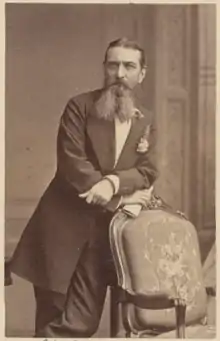
| Party | Candidate | Votes | % | ±% | |
|---|---|---|---|---|---|
| Conservative | John Eldon Gorst | 3,187 | 56.8 | +0.3 | |
| Liberal | Andrew Clarke | 2,422 | 43.2 | −0.3 | |
| Majority | 765 | 13.6 | +0.6 | ||
| Turnout | 5,609 | 80.3 | −5.6 | ||
| Registered electors | 6,988 | ||||
| Conservative hold | Swing | +0.3 | |||
Elections in the 1890s
| Party | Candidate | Votes | % | ±% | |
|---|---|---|---|---|---|
| Conservative | Lewis Vivian Loyd | 3,777 | 52.6 | −4.2 | |
| Liberal | Andrew Clarke | 3,400 | 47.4 | +4.2 | |
| Majority | 377 | 5.2 | −8.4 | ||
| Turnout | 7,177 | 83.2 | +2.9 | ||
| Registered electors | 8,629 | ||||
| Conservative hold | Swing | −4.2 | |||
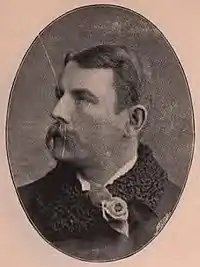
| Party | Candidate | Votes | % | ±% | |
|---|---|---|---|---|---|
| Conservative | Horatio Davies | 4,082 | 53.8 | +1.2 | |
| Liberal | Robert Hippisley Cox | 3,499 | 46.2 | −1.2 | |
| Majority | 583 | 7.6 | +2.4 | ||
| Turnout | 7,581 | 82.4 | −0.8 | ||
| Registered electors | 9,199 | ||||
| Conservative hold | Swing | +1.2 | |||
Elections in the 1900s
| Party | Candidate | Votes | % | ±% | |
|---|---|---|---|---|---|
| Conservative | Horatio Davies | Unopposed | |||
| Conservative hold | |||||
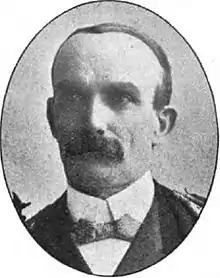
| Party | Candidate | Votes | % | ±% | |
|---|---|---|---|---|---|
| Labour Repr. Cmte. | John Jenkins | 6,692 | 62.5 | New | |
| Conservative | John Eustace Jameson | 4,020 | 37.5 | N/A | |
| Majority | 2,672 | 25.0 | N/A | ||
| Turnout | 10,712 | 79.7 | N/A | ||
| Registered electors | 13,432 | ||||
| Labour Repr. Cmte. gain from Conservative | |||||
Elections in the 1910s
| Party | Candidate | Votes | % | ±% | |
|---|---|---|---|---|---|
| Conservative | Gerald Hohler | 7,411 | 54.7 | +17.2 | |
| Labour | John Jenkins | 6,130 | 45.3 | −17.2 | |
| Majority | 1,281 | 9.4 | N/A | ||
| Turnout | 13,541 | 85.7 | +6.0 | ||
| Registered electors | 15,799 | ||||
| Conservative gain from Labour | Swing | +17.2 | |||
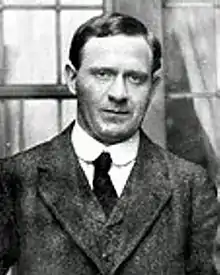

| Party | Candidate | Votes | % | ±% | |
|---|---|---|---|---|---|
| Conservative | Gerald Hohler | 6,989 | 56.4 | +1.7 | |
| Liberal | Louis Bernacchi | 4,302 | 34.7 | New | |
| Labour | Frank Smith | 1,103 | 8.9 | −36.4 | |
| Majority | 2,687 | 21.7 | +12.3 | ||
| Turnout | 12,394 | 78.4 | −7.3 | ||
| Registered electors | 15,799 | ||||
| Conservative hold | |||||
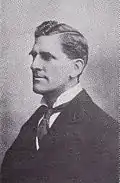
| Party | Candidate | Votes | % | ±% | |
|---|---|---|---|---|---|
| Unionist | John Moore-Brabazon | 11,454 | 62.4 | +6.0 | |
| Labour | Dansy Hubbard | 4,134 | 22.5 | +13.6 | |
| Liberal | H. B. D. Woodcock | 2,778 | 15.1 | −19.6 | |
| Majority | 7,320 | 39.9 | +18.2 | ||
| Turnout | 18,366 | 59.2 | −19.2 | ||
| Registered electors | 31,000 | ||||
| Unionist hold | Swing | -3.8 | |||
Elections in the 1920s
| Party | Candidate | Votes | % | ±% | |
|---|---|---|---|---|---|
| Unionist | John Moore-Brabazon | 11,335 | 51.5 | −10.9 | |
| Liberal | Alfred John Callaghan | 10,682 | 48.5 | +33.4 | |
| Majority | 653 | 3.0 | −36.9 | ||
| Turnout | 22,017 | 69.8 | +10.6 | ||
| Registered electors | 31,525 | ||||
| Unionist hold | Swing | −22.1 | |||
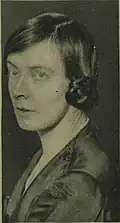
| Party | Candidate | Votes | % | ±% | |
|---|---|---|---|---|---|
| Unionist | John Moore-Brabazon | 9,994 | 41.6 | −9.9 | |
| Liberal | Alfred John Callaghan | 8,227 | 34.3 | −14.2 | |
| Labour | Mary Hamilton | 5,794 | 24.1 | New | |
| Majority | 1,767 | 7.3 | +4.3 | ||
| Turnout | 24,015 | 74.6 | +4.8 | ||
| Registered electors | 32,212 | ||||
| Unionist hold | Swing | +2.2 | |||

| Party | Candidate | Votes | % | ±% | |
|---|---|---|---|---|---|
| Unionist | John Moore-Brabazon | 13,184 | 52.2 | +10.6 | |
| Labour | William Harvey Moore | 9,276 | 36.7 | +12.6 | |
| Liberal | Cyril Berkeley Dallow | 2,806 | 11.1 | −23.2 | |
| Majority | 3,908 | 15.5 | +8.2 | ||
| Turnout | 25,266 | 77.8 | +3.2 | ||
| Registered electors | 32,481 | ||||
| Unionist hold | Swing | +10.6 | |||
| Party | Candidate | Votes | % | ±% | |
|---|---|---|---|---|---|
| Labour | Frank Markham | 13,007 | 42.6 | +5.9 | |
| Unionist | John Moore-Brabazon | 12,231 | 40.1 | −12.1 | |
| Liberal | George H Bryans | 5,284 | 17.3 | +6.2 | |
| Majority | 776 | 2.5 | N/A | ||
| Turnout | 30,522 | 74.5 | −3.3 | ||
| Registered electors | 40,980 | ||||
| Labour gain from Unionist | Swing | +9.0 | |||
Elections in the 1930s
| Party | Candidate | Votes | % | ±% | |
|---|---|---|---|---|---|
| Conservative | Park Goff | 19,991 | 62.5 | +22.4 | |
| Labour | Oliver Baldwin | 10,837 | 33.9 | −8.7 | |
| New Party | Martin Woodroffe | 1,135 | 3.6 | New | |
| Majority | 9,154 | 28.6 | New | ||
| Turnout | 31,963 | 75.5 | +1.0 | ||
| Registered electors | 42,356 | ||||
| Conservative gain from Labour | Swing | +15.6 | |||
The sitting MP Sydney Frank Markham sought re-election as a National Labour candidate. However, the Conservatives refused to withdraw in his favour. As a result, he was forced to withdraw. Communist candidate Walter Hannington was also adopted[20] but subsequently withdrew.[21]
| Party | Candidate | Votes | % | ±% | |
|---|---|---|---|---|---|
| Conservative | Leonard Plugge | 19,212 | 59.1 | −3.4 | |
| Labour | Hugh Gaitskell | 13,315 | 40.9 | +7.0 | |
| Majority | 5,897 | 18.2 | −10.4 | ||
| Turnout | 32,527 | 74.6 | −0.9 | ||
| Registered electors | 43,573 | ||||
| Conservative hold | Swing | −5.3 | |||
Elections in the 1940s
| Party | Candidate | Votes | % | ±% | |
|---|---|---|---|---|---|
| Labour | Arthur Bottomley | 19,250 | 55.3 | +14.4 | |
| Conservative | Leonard Plugge | 15,534 | 44.7 | −14.4 | |
| Majority | 3,716 | 10.6 | N/A | ||
| Turnout | 34,784 | 72.1 | −2.5 | ||
| Registered electors | 48,270 | ||||
| Labour gain from Conservative | Swing | +14.4 | |||
References
- 1 2 3 4 5 Stooks Smith, Henry (1973) [1844–1850]. Craig, F. W. S. (ed.). The Parliaments of England (2nd ed.). Chichester: Parliamentary Research Services. p. 378. ISBN 0-900178-13-2.
- 1 2 3 Gash, Norman (2013). Politics in the Age of Peel: A Study in the Technique of Parliamentary Representation, 1830–1850. Faber & Faber. p. 330. ISBN 9780571302901. Retrieved 22 April 2018.
- 1 2 Parliament Commons, Lists (1838). The Assembled Commons or Parliamentary Biographer: 1838. p. 46.
- 1 2 Hall, Catherine; Draper, Nicholas; McClelland, Keith; Donington, Katie; Lang, Rachel (2014). "Appendix 4: MPs 1832–80 in the compensation records". Legacies of British Slave-ownership: Colonial Slavery and the Formation of Victorian Britain. Cambridge: Cambridge University Press. p. 290. ISBN 978-1-107-04005-2. Retrieved 22 April 2018.
- 1 2 Dod, Charles Roger (1843). "House of Commons". The Parliamentary Companion, Volume 11. London: Whitaker & Company. p. 133. Retrieved 22 April 2018.
- 1 2 Mosse, Richard Bartholomew (1838). "House of Commons". The Parliamentary Guide: a concise history of the Members of both Houses, etc. p. 148. Retrieved 22 April 2018.
- 1 2 3 4 5 6 7 8 9 10 11 12 13 14 15 16 Craig, F. W. S., ed. (1977). British Parliamentary Election Results 1832-1885 (e-book) (1st ed.). London: Macmillan Press. ISBN 978-1-349-02349-3.
- ↑ "Chatham". South Eastern Gazette. 13 July 1852. p. 3. Retrieved 22 April 2018 – via British Newspaper Archive.
- 1 2 Harries-Jenkins, Gwyn (2007). "Chapter 7". The Army in Victorian Society. Abingdon: Routledge. p. 243. ISBN 978-0-415-41274-2. Retrieved 22 April 2018.
- ↑ "Controverted Elections". Morning Post. 8 June 1853. p. 2. Retrieved 22 April 2018 – via British Newspaper Archive.
- ↑ Williams, William Rees (1897). . In Lee, Sidney (ed.). Dictionary of National Biography. Vol. 49. London: Smith, Elder & Co.
- ↑ "Election News". The Scotsman. 11 February 1875. p. 6. Retrieved 28 December 2017 – via British Newspaper Archive.
- ↑ "Election News". Sheffield Independent. 27 November 1882. p. 2. Retrieved 24 November 2017.
- 1 2 3 4 5 6 7 8 Craig, FWS, ed. (1974). British Parliamentary Election Results: 1885-1918. London: Macmillan Press. p. 94. ISBN 9781349022984.
- ↑ Debrett's House of Commons & Judicial Bench, 1886
- ↑ Debrett's House of Commons & Judicial Bench, 1901
- ↑ Debrett's House of Commons & Judicial Bench, 1916
- 1 2 3 4 5 6 7 8 Craig, F.W.S., ed. (1969). British parliamentary election results 1918-1949. Glasgow: Political Reference Publications. p. 225. ISBN 0-900178-01-9.
- ↑ Debrett's House of Commons & Judicial Bench, 1922
- ↑ OUR SPECIAL CORRESPONDENT. "Kent." Times [London, England] 14 Oct. 1931: 6. The Times Digital Archive. Web. 18 July 2016.
- ↑ "General Election: List Of Nominations." Times [London, England] 17 Oct. 1931: 6. The Times Digital Archive. Web. 18 July 2016.
Leigh Rayment's Historical List of MPs – Constituencies beginning with "C" (part 3)